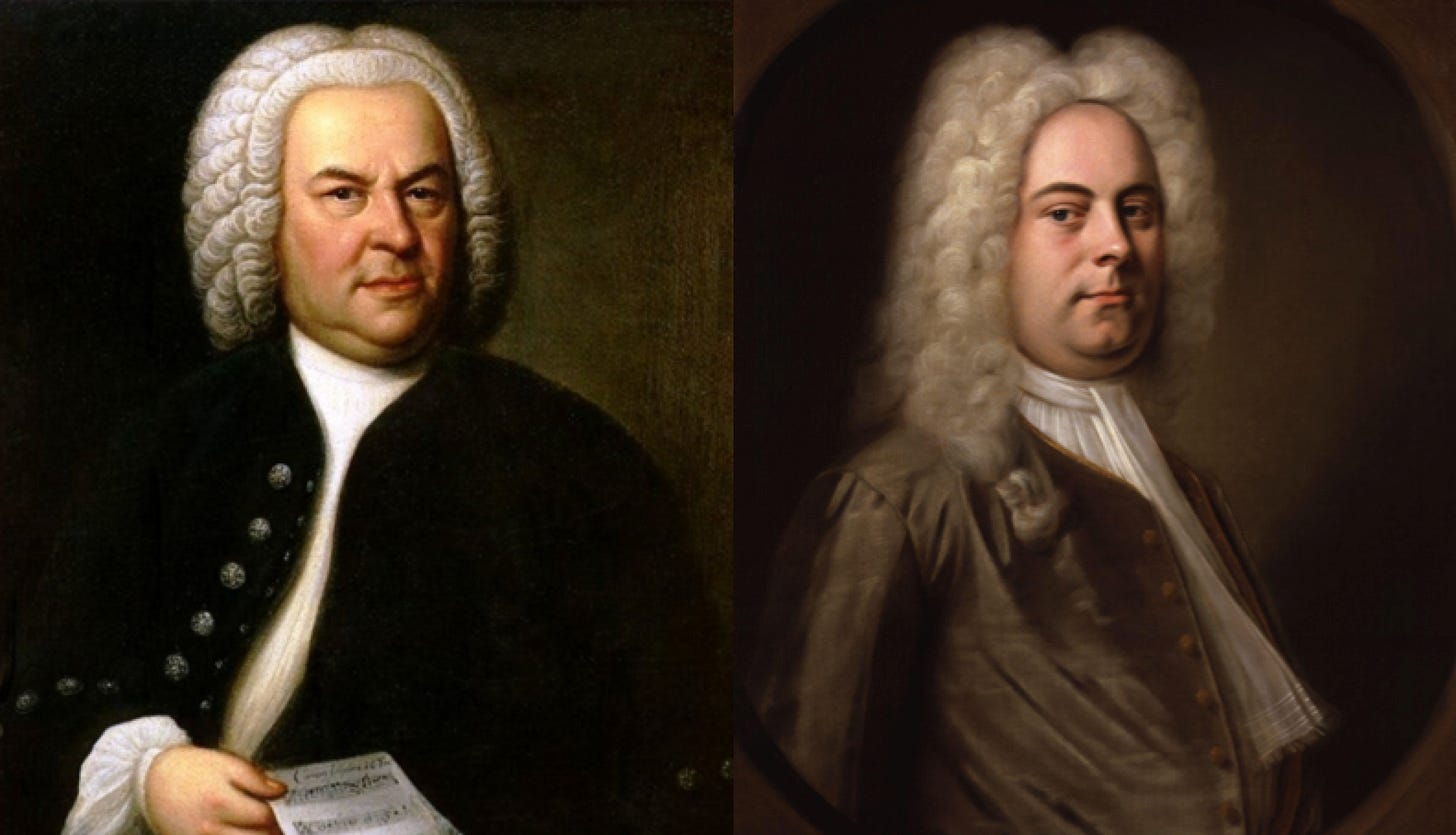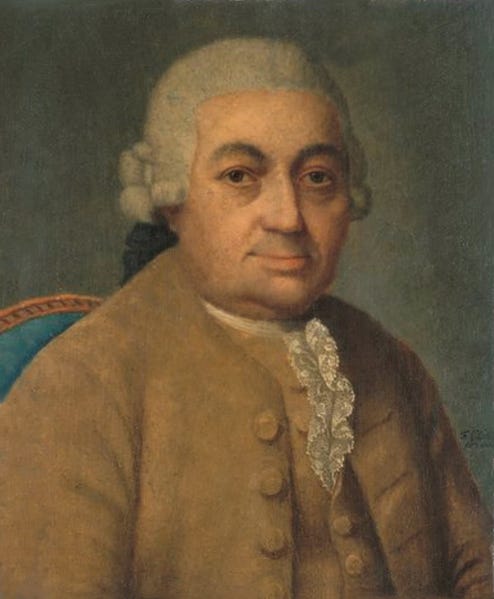How a Doctor Killed the Baroque Era
Dr. John Taylor treated Bach and Handel with disastrous results, perhaps causing the death of both composers. Did it impact the course of Western music?
Did a doctor really kill the Baroque era?
That seems like an extravagant assertion until you look into the life and times of Dr. John Taylor, a British surgeon. His clumsy and ill-fated interventions left Bach and Handel blind, and may have contributed to the death of both composers. In the long history of the Western world, few doctors have caused more harm—no small claim, that.
The Honest Broker is a reader-supported guide to music, books, and culture. Both free and paid subscriptions are available. If you want to support my work, the best way is by taking out a paid subscription.
How did this incompetent ophthalmologist gain the trust of people as brilliant as Bach and Handel? You can’t blame the composers—there were no Yelp reviews back then. Patients believed what they heard about Dr. Taylor, who was personal eye doctor to King George II. He also counted the Pope and the Holy Roman Emperor among his patients—at least that’s what he told people.
Everything about Dr. Taylor was impressive—at least at first glance. He certainly looked the part of an esteemed doctor. Adding to the effect, he allegedly gave an eloquent speech before every operation, praising his own remarkable abilities as a surgeon.
It’s not entirely clear how much of his CV was fabricated, but there’s good reason to doubt that he was a knight (or chevalier) as he asserted in his 1761 autobiography. That book is filled with many unsubstantiated boasts. But fact-checking was hard in that era, and (like today) few dared to challenge a proud doctor, especially patients seeking treatment.
Even so, some were skeptical back then. The distinguished English author Samuel Johnson (1709-1784) once described Dr. Taylor as "an instance of how far impudence may carry ignorance."
This doctor later confessed that he had left hundreds of his patients blind. Perhaps he wasn’t a total charlatan—he made a few genuine contributions to our understanding of ocular health. But he was a nightmare as a surgeon.
You may have read somewhere that the Baroque era ended in 1750, and assumed that this was just an arbitrary date chosen by music historians—who like nice round numbers at the beginning or midpoint of centuries. But in this instance, Dr. Taylor played a decisive role, ensuring that a new generation of composers would move to the forefront of European music after that momentous year.
Bach had chronic vision problems throughout his life, but perhaps only nearsightedness at first. Eyeglasses were rarely used except for reading at this point in history, but even without corrective lenses Bach should have been able to write down his compositions without any trouble, even if his myopia was excessive. But as he got older, the composer’s vision deteriorated further, most likely because of cataracts.
This is a simple enough problem to fix nowadays. A cataract operation only takes a few minutes to perform, and patients don’t even need to stay in a hospital—it can all happen on an outpatient basis. But matters weren’t quite so simple in the 18th century.
Untreated cataracts won’t kill you (unlike Dr. Taylor), but your vision will continue to get cloudier and cloudier, until you can hardly see anything. We can only guess how far advanced the problem had become in the case of Bach, but he probably felt that his musical vocation was seriously hindered by poor vision.
In this context, friends persuaded Bach to see Dr. Taylor, who was visiting Leipzig. The composer underwent two operations, the first at the end of March 1750, and the second around a week later in early April. We don’t know the details, but these procedures left Bach completely blind.
That’s no surprise. Dr. Taylor’s standard procedure included administering laxatives and bloodletting from the patient. In addition, Taylor used the blood from slaughtered pigeons as eye drops, and often applied a baked apple to the eye with a bandage. Adding to the abuse, he charged large sums for his procedures—especially if he judged that the patient was wealthy.
Bach survived a few weeks after the second procedure, but it seems likely that these failed eye operations directly caused his rapid decline and death. Taylor’s approach was extremely unhygienic, and thus likely to lead to post-surgical infections. I remind readers that antibiotics didn’t exist back then, and an infection, once it had set in, was often fatal. In any event, Bach died on July 28, 1750 at age 65.
But here’s where the story gets stranger. Handel suffered injury in a carriage accident in August 1750—just a few days after Bach’s death. I almost want to give credence to astrology and horoscopes in this instance, especially because both of these composers were born a few days apart in 1685. It’s almost as if some larger synchronicity coordinated their personal timelines.
In the aftermath of his accident, Handel had chronic problems with his eyesight. By 1753, his activities as a composer were compromised, although he could rely on the help of assistant John Christopher Smith. Handel also continued to perform as an organist—a surviving description from the Earl of Shaftesbury declares that “Handel’s playing is beyond what even he ever did.” And if we can believe Charles Burney’s account, set down three decades later, Handel relied on memorized works at first, but also started embracing an improvisational approach that required little written music:
“Giving the band only the skeleton, or ritornels of each movement, he played all the solo parts extempore, while the other instruments left him ad libitum; waiting for the signal of a shake, before they played such fragments of symphony as they found in their books.”
This description makes it sound like jazz—and maybe it was.
But now Dr. John Taylor enters the picture again—apparently determined to put an end to Baroque music. We have very few details, but Taylor clearly accompanied Handel to Tunbridge Wells in August 1758, where another failed eye operation likely took place. Not only was Handel now blind—although that didn’t prevent Taylor from bragging about treating the famous composer—but also severely incapacitated.
Handel died the following April. As with Bach, Handel’s consultations with Taylor were followed by a rapid decline in his health. Something of the composer’s mindset can be gathered from his decision, a short while after his treatment, to alter his will—adding a sizable bequest to cover the expenses of ailing musicians. A few days later, on April 14, 1759, Handel died at age 74.
Some have tried to draw moral lessons from this story of the doctor who contributed to the decline and death of the two greatest composers of the era. They take some macabre comfort in knowing that Dr. Taylor eventually lost his own eyesight.
But I also note, with sad irony, that the current technology for breaking up a cataract relies on ultrasound via a process known as phacoemulsification—you might even describe it as a kind of high tech music, a therapeutic use of sound which is almost a metaphor for Bach and Handel’s own work. It’s fitting that this procedure was invented by a jazz saxophonist.
But in the case of Bach and Handel, the cataract destroyed the sounds, rather than (as happens today) the sounds destroying the cataract.
Yet the musical aftermath of these deadly medical procedures is the real story here. With Bach and Handel dead, the musical landscape was left open for a new generation of composers, with much different stylistic preferences.
The generational hand-off here was particularly noteworthy in the case of Bach. That’s because his son Carl Philipp Emanuel Bach (1714-1788) was arguably the most prominent European composer in the immediate aftermath of his father’s death in 1750. Yet don’t be fooled by the last name—his music is markedly different from Papa Bach’s, and signals a clear transition from the Baroque to the Classical style, laying the groundwork for Haydn and Mozart. As odd as it sounds nowadays, those two composers learned more from C.P.E. Bach than from J.S. Bach.
This shift would have happened under any scenario, but perhaps not quite as soon. So Dr. Taylor may have failed to restore the eyesight of Europe’s greatest composers, but he did accelerate the evolution of compositional styles.
I would trade all that in exchange for a decade or two more of new music from Bach and Handel. Even so, I still must give Dr. John Taylor credit. This pompous charlatan was a horrible doctor and his autobiography is filled with dubious boasting, but those very shortcomings allowed him to exert a greater impact on the culture than any of his peers.








Hindsight IS, after all, 20/20.
Terrifically informative post, and so well-written. Thank you!